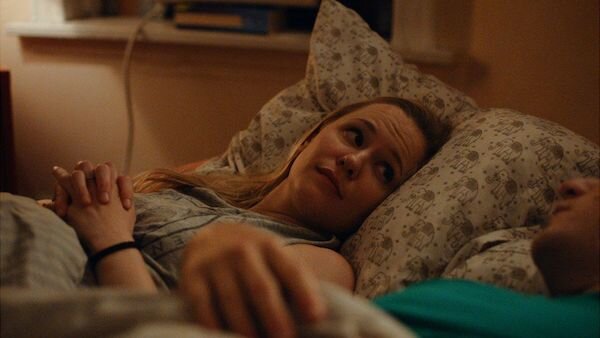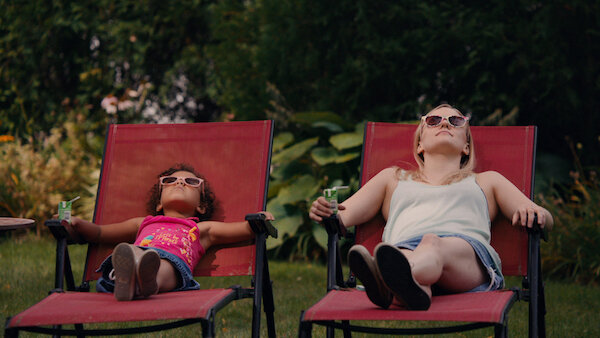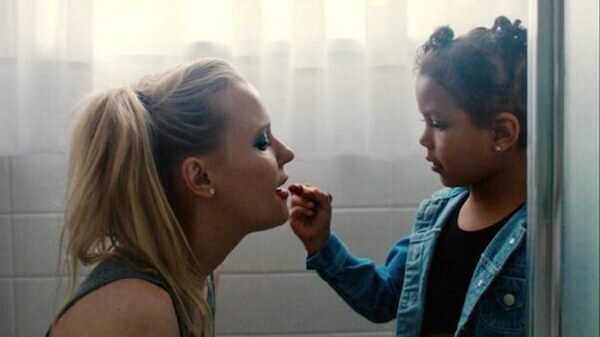Framing womanhood in the vivid, intimate ways so rarely trusted in cinema, Saint Frances signals a quiet revolution led by Kelly O’Sullivan. The writer-actor thrusts familiar scenarios to the fore, and pushes shame out the window. In conversation with Ella Kemp, O’Sullivan opens up about selfish men, the wisdom of women, and finding faith beyond God.
A dark red smear of period blood on a 20something man’s cheek. This is the kind of image women have known, or might have seen, in their private lives. An embarrassing mishap that must be washed off quickly and apologised for profusely. This isn’t the kind of image to typically make it onto the big screen
For such a scene, we have Kelly O’Sullivan to thank, the writer and star of Saint Frances, one of the most affecting and intelligent films of the year. O’Sullivan plays Bridget, a 34-year-old woman who begins her time with us by having an abortion and then gets a job as a nanny. It is an always challenging, complicated and rewarding portrait of womanhood in ways so specific that it can feel as if O’Sullivan has been quietly looking over your shoulder for years, taking notes. With Saint Frances, she’s telling you that you’re fine, you haven’t done anything wrong. That thing you were ashamed of? She, and we, have all lived it too.
On period sex, fallen Catholics and scheduled crying, the writer-actor lets us explore the world of Saint Frances.
The script feels personal in an extremely vivid way. Was there any one event that sparked what became Saint Frances for you?
Yeah, two events. One was that I was actually a nanny in my late 20s, and the other was that in my early 30s, I got an abortion. I thought both of those experiences are actually very impactful and nuanced, whereas often what I've seen in TV and film makes it seem really scary. The woman is always really questioning her choice. So I wanted to write something where an abortion is one event, not the entire plot point. And a woman can be sure! As soon as she finds out she's pregnant, she knows she's going to get an abortion.
I wanted to portray it in a way that I went through it, which was that you don't have to feel guilty. You don't have to spend a week in agony questioning whether or not you should go through with this. Then you can have complicated feelings that don't involve guilt or regret. So I knew that I could portray both of those experiences authentically and with specificity, and I thought, what if I combined both of those experiences into one summer, and how those things play off of each other?
The way you film blood is quietly revolutionary, because Saint Frances offers the only instance in which I can remember seeing blood coming from a woman’s body that isn’t a horror film. What did you want viewers to feel?
I knew it was always going to be a crucial intention, because women have such a regular experience with blood, it's a huge part of our adult lives. We spend so much time trying to disguise it and cover it up and not let anybody know that we're on our periods. Then I had my abortion, I had sort of prolonged on-again, off-again bleeding, and I just couldn't shy away from it. It was always interrupting my daily life and reminding me about this choice that I had made. So I knew that it had to have a place on screen, it couldn't just exist off-screen.
When it comes to period sex, there's not enough normalizing of that. From the beginning, I knew I wanted it to be realistic, and in order for it to be realistic it had to be, in a certain way, graphic – and that one of the first things we would see is period sex. It’s saying to the audience, “This is the film that you're going to see and it's going to involve blood, yes, but it's not going to be horrific. It's going to be part of life.”
The opening scene is funny, but in a way that takes you a second to adjust and realise that everything is fine – we’re all laughing together because this is such a normal thing.
It's not gross-out humour, and it's not pointing our fingers and laughing at this woman. It's hopefully saying “This is okay!” Maybe it's awkward because it hasn't been completely normalized yet, but the way these two characters are communicating is intimate. It can be light-hearted, and it shows that they share a sense of humour in the way that they approach the world. Hopefully as soon as people see it, they wonder, “Why do I feel discomfort when watching that?” and it brings up questions that I would love people to ask themselves.
I can imagine a lot of people watching and thinking, “I wish this person had reacted in that way when this happened to us.” It makes you wonder why you couldn’t behave differently in your own life.
Exactly. Why are we trained to be so embarrassed? Why are men trained to react in a certain way? It was important to show two different ways men react – to have a younger guy who is sensitive and lovely and has a sense of humour. He's so not bothered! There are plenty of guys like that, but then you also have men who see it as disgusting, and make women feel shame.
I find the male characters extremely telling in a film about a woman, written or directed by a woman, in terms of how they interact with this woman in her world. Jace, the younger guy, is trying to deal with the fact that Bridget has too much to handle on her own, he talks about her unprocessed feelings and residual sadness, verbalising everything she can’t express.
I loved that so much, because too often men are painted as the repressed ones, and this was such a refreshing subversion for him to be forcing Bridget to reckon with her feelings.
He's very open about it. I think because his body hasn't gone through it, he's able to talk about it in a way that she's not ready for yet. I wanted to show an example of a guy who can be truly lovely and it can still be complicated – because in so many abortion narratives, the guy's just a total asshole. People are able to easily dismiss him or say “Well, that's why she chose to not have this child, she didn't have a supportive partner.” I wanted to depict something more nuanced, which is that your partner can be saying and doing all the right things, and it can still be so messy and complicated.
Especially when he’s saying, “I would love to talk about this with you” and every instinct in her body is saying, “I cannot talk about this right now.” Then she pivots to a guy who is never going to ask her a question about herself, who is so self-obsessed that she doesn’t have to worry about him wanting to talk about her feelings.
He drives me insane – but because he is so well-written. I hate to say it but I recognise so many more men like him than like Jace.
Absolutely, yes! I’ve known people who have said some of his lines to me.
Me too. I was nodding the whole time. When he’s first introduced you think he’s this cartoonish trope but you quickly realise that this is just a real man saying real things…
They’re out there walking around, not questioning their choices, thinking that they’re doing everything right.
When he and Bridget are having sex and she asks if he can wear a condom and he just says, “I hate those things,” and then later says, “You should be on birth control”, I found that infuriating and amazing. It really anchors the importance of Bridget being in control of her own body, rather than doing what anyone thinks or knows or tells her to.
The weight of not having a child always falls on the woman. Women are expected to make sure we don't get pregnant. If we get pregnant, it's our fault rather than realizing there are always two people involved. The assumption should be that we're on birth control, so that men can just do whatever they want. But as a sexual woman, I feel that I've so often encountered someone saying, “I shouldn't have to do this thing. You have to take care of that.” And how deeply unfair and upsetting that is to me.
Women have been taught very young about physically dealing with this consequence – but it’s not even a little spot in his brain. Unfortunately I’ve learned the hard way, we all have to learn the hard way about men like that. There was a time when I was younger and thought “Is there something wrong with me?” But as you get older, you learn more about these guys and you learn that’s not the way it should be.
For a teenage girl who might not be having those conversations with her parents or friends, to see a film like this could make her realise, “I’ve had that experience and it’s not right, even though the person in my life made me think it was.”
A huge goal was to normalize many things that have been othered in TV and film, so that hopefully if young women are watching Saint Frances, or even older women, they might flashback to an experience and be able to reframe it. To help women have a greater sense of acceptance and not shame themselves, or if people try to shame you, to say that there's a different way of looking at the world.
Did you ever consider directing the film yourself? And at what point did you realise that your partner Alex Thompson would be the right person to do it?
I never thought about directing it because I knew I would be both writing and acting in it, and I thought, “I cannot have that be my first directing experience, that's just a recipe for a mental breakdown!” Alex is my romantic partner, we've been together for years and I knew he was a fantastic director. When I started writing the script, I handed him the first 10 pages and he responded so well to it. As I kept writing, we would have these really in-depth, head-butting conversations in a way that I don't think I could have had with another person on the planet.
Living with somebody and having that kind of intimacy, I knew that he would treat the script the way that was important to me, which is that it’s not a fluffy, saccharin, cutesy comedy. It's funny, but grounded in reality. His favourite directors are Sidney Lumet and Hal Ashby who have that in their work. I’m so grateful for all the really hard conversations we had. Getting to see him work in that way made me respect him even more, when I started off respecting him at a level 10.
I want to ask about one specific person on set – tell me about working with Ramona Edith Williams, who plays Frances. How in the world did you build such a wonderful relationship?
We just got so lucky because she's one of the most open, loving, smart kids I've ever seen. She and I got along like gangbusters from the very start. She walked in and was so tiny and so young, and I think my nanny instincts kicked in. We didn't really have bonding time before we started filming, I went down and watched her ice skate one day, and then we had a barbecue before we started filming, but just right away, that chemistry and bond was there. It was real. I would work with her again and again, because she's so present, she's not coached, which is so hard to find in a child actor. She made everything more fun.
At the same time, it feels like so many of her lines are delivered so seriously. Franny is explaining these very calm, lucid things she knows about, rather than being told to say anything. She’s never messing around with it.
I don’t know how she does it. I can’t do that as an actor, most actors I know can’t do that! She was word-perfect too, everything she says in the film was on the page. To have somebody at that age – she was six years old – be able to deliver really complicated lines… that is the best acting in the world.
My favourite line is when she says, “I have to find something most comfortable for my body, because every woman’s body is different.” It feels like it comes out of nowhere and yet is so in tune with everything else.
I think it’s an example of her having picked up specific language because she lives in a very progressive house. But also the women in the household are struggling to accept what they’re personally going through. So she’s able to pinpoint what these women are struggling with but can’t accept for themselves. They can teach it, but it’s another thing to actually be able to apply it to your own life.
I often thought with Franny’s lines that I could imagine a 34-year-old woman saying them and it would make complete sense. When you were looking at the age of these women, of Bridget but also of Maya and Annie, Franny’s mothers, was this always the demographic you were interested in focusing on?
Women are made to think about our ages in a way that men don’t have to: our biological clocks, our physical appearance, when we start to lose desirability or sexuality is when women start to become invisible. We're constantly worried, reminded of our age and how important it is. I knew that I wanted to have a multi-generational cast of women talking about and teaching each other things that had to do with where they are in their life. Franny hasn't learned to be embarrassed, she hasn't learned shame. Bridget is in the middle of being told, “You are going to have a geriatric pregnancy if you wait another second longer if you don't make these reproductive choices soon.” Everybody's just telling her, “You have so little time.” Then Maya and Annie are going through complicated parenting challenges and what it's like to have been married for over a decade and then Bridget’s mum saying, “This is what it was like for me when I was going through postpartum.”
I'm just endlessly fascinated by the conversations that I have with women of all ages and the way that it recontextualizes the world for me. When I talk to Alex's grandmothers, and they talk about what it was like to be young women and to have children at 23 or 24. Then when I talk to young women now and how different their experience is from when I was a teenager, it's something that is constantly complex and fascinating.
Quite early in the film, Bridget describes herself as a fallen Catholic, and later tells Franny, “Faith is something you can have in people as well.” Faith is so present in the film but never in an overwhelming way – why was that important for you?
I was raised Irish Catholic. I went to Immaculate Conception elementary school, from kindergarten until eighth grade. Every year we would have to make pro-life posters, involuntarily, it was a poster contest. So even though I’m incredibly pro-choice, I'm still to this day unpacking those images that were placed in my brain as a child.
I thought it would be interesting to explore Catholicism the way it is for me – in the background to a lot of experiences, especially when it comes to the Church's stance on abortion. Not to hit it over the head, to have it be a light touch that people can infer what they want to. To show Maya be a practicing Catholic who has a fantastic relationship with Catholicism. Because again, I didn't want it to be easily dismissible. I didn't want Catholics to see this and just say, “Well, this is trouncing on our faith.” I wanted it to be complex and nuanced in the way that people actually experience religion, or maybe taking a step away from religion. I’m agnostic, I don’t know what the deal is, but what I can bank on is that there’s good in people and I get a lot of love and inspiration from that.
I love when Bridget starts crying and says, “I don’t know why I’m crying, I’m an agnostic feminist.”
I feel that all the time! Intellectually I might think one way but then I have these deep, bubbling, complicated feelings that go beyond an intellectualisation of things.
To have such messy feelings, it feels like the kind of instance when because you don’t know why you’re crying, it makes you cry even more, and then you give yourself a headache, and then that just makes you cry even more…
And all of those things have been simmering under the surface and that first thing that makes you cry triggers all these other things. Which is probably an experience I have once every two months…
Saint Frances is out in select cinemas from 24th July 2020.
Ella Kemp (@ella_kemp) is a film critic and editor based in London. She is the Contributing Editor for READ ME and the Film Editor for the Quietus. She writes for NME, Empire, Letterboxd and more. Her favourite word is “verklempt” because it’s what she often is.




